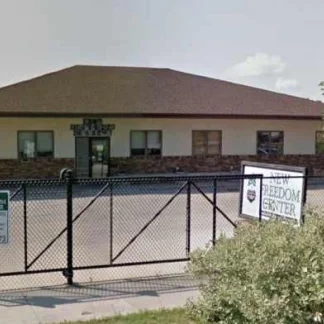Sanford Medical Center - Inpatient
Sanford Medical Center – Inpatient is a private rehab located in Bismarck, North...
New Freedom Center is located in Bismarck, North Dakota. New Freedom Center provides treatment dedicated to the restoration of health of individuals and families afflicted with or affected by addictive diseases.
Contact us for more information: (701) 222-4673

Connect with New Freedom Center by calling their admissions team directly.
(701) 222-4673 Website Get DirectionsNew Freedom Center’s Family Program is designed to aid and encourage people who live with or care about a person with an addiction. Through informed discussion and guidance family members learn they cannot control their loved one's addiction, but they can take ownership of their own health and well-being. The challenges of living with addiction have many consequences for a family. Families of alcoholics and addicts can often feel confused, angry, and helpless. Their family program helps to diminish anxiety and promotes healing for loved ones. Their goal is reconciliation and teaching family members to identify new, healthy ways of coping with addiction and relationships.
Group therapy is any therapeutic work that happens in a group (not one-on-one). There are a number of different group therapy modalities, including support groups, experiential therapy, psycho-education, and more. Group therapy involves treatment as well as processing interaction between group members.
In individual therapy, a patient meets one-on-one with a trained psychologist or counselor. Therapy is a pivotal part of effective substance abuse treatment, as it often covers root causes of addiction, including challenges faced by the patient in their social, family, and work/school life.
Group therapy is any therapeutic work that happens in a group (not one-on-one). There are a number of different group therapy modalities, including support groups, experiential therapy, psycho-education, and more. Group therapy involves treatment as well as processing interaction between group members.
In individual therapy, a patient meets one-on-one with a trained psychologist or counselor. Therapy is a pivotal part of effective substance abuse treatment, as it often covers root causes of addiction, including challenges faced by the patient in their social, family, and work/school life.
In individual therapy, a patient meets one-on-one with a trained psychologist or counselor. Therapy is a pivotal part of effective substance abuse treatment, as it often covers root causes of addiction, including challenges faced by the patient in their social, family, and work/school life.
Sanford Medical Center – Inpatient is a private rehab located in Bismarck, North...
Heartview Foundation is located in the historic district of downtown Bismarck, N...
Pride Manchester House is a private rehab located in Bismarck, North Dakota. Pri...
Saint Alexius Medical – Partial Hospitalization Program is a private rehab locat...